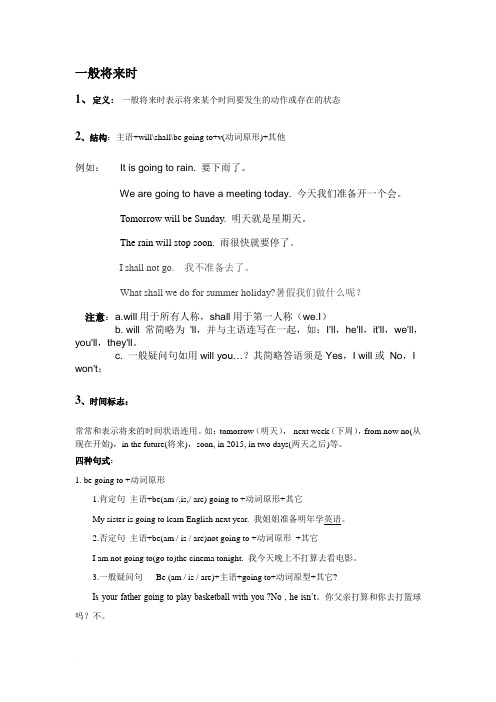小学英语-一般将来时
- 格式:pptx
- 大小:12.46 MB
- 文档页数:37

一般将来时1、定义:一般将来时表示将来某个时间要发生的动作或存在的状态2、结构:主语+will\shall\be going to+v(动词原形)+其他例如:It is going to rain. 要下雨了。
We are going to have a meeting today. 今天我们准备开一个会。
Tomorrow will be Sunday. 明天就是星期天。
The rain will stop soon. 雨很快就要停了。
I shall not go. 我不准备去了。
What shall we do for summer holiday?暑假我们做什么呢?注意:a.will用于所有人称,shall用于第一人称(we.I)b. will 常简略为'll,并与主语连写在一起,如:I'll,he'll,it'll,we'll,you'll,they'll。
c. 一般疑问句如用will you…?其简略答语须是Yes,I will或No,I won't;3、时间标志:常常和表示将来的时间状语连用。
如:tomorrow(明天),next week(下周),from now no(从现在开始),in the future(将来),soon, in 2015, in two days(两天之后)等。
四种句式:1. be going to +动词原形1.肯定句主语+be(am /,is,/ are) going to +动词原形+其它My sister is going to learn English next year. 我姐姐准备明年学英语。
2.否定句主语+be(am / is / are)not going to +动词原形+其它I am not going to(go to)the cinema tonight. 我今天晚上不打算去看电影。

一般将来时1、第一人称(we 和I)用shall:shall+动词原形意义: 一般单纯地表示将来某个时间将要发生的动作或存在的状态。
肯定句:We shall go on the Pearl River.否定句:We shall not/shan’t go on the Pearl River.一般疑问句:-- Shall we go on the Pearl River?--Y es, we shall. /No, we shall not/shan’t.特殊疑问句:--When shall we go on the Pearl River?--Tomorrow morning.2、第一、二、三人称用will: will+动词原形意义: 一般单纯地表示将来某个时间将要发生的动作或存在的状态。
肯定句:He will go on the Pearl River.否定句:He will not/won’t go on the Pearl River.一般疑问句:--Will he go on the Pearl River?--Y es, he will. /No, he won’t.特殊疑问句:--When will he go on the Pearl River?--Tomorrow morning.3、第一、二、三人称用be going to+动词原形意义:用来表示近期将要发生的动作或存在的状态,以及计划、安排、打算要做的事。
肯定句:He is going to watch birds there.否定句:He is not/isn’t going to watch birds there.一般疑问句:--Is he going to watch birds there?--Y es, he is. / No, he isn’t.特殊疑问句:--What is he going to do?-- He is going to watch birds there.4、用现在进行时表示表示位置转移的动词(如:go, come, leave, start, arrive等),可用现在进行时表示将来时。


小学一般将来时讲解1. 介绍小学一般将来时是英语语法中的一种时态,用来表示将来发生的行动或事件。
在这种时态中,动作与时间的关系是相对的,即动作将在将来某一时刻发生。
2. 构成小学一般将来时由情态动词 "will" 或 "shall" 加上动词原形构成。
下面是一些例子:- I will go to school.- She will play basketball.- We shall see a movie.3. 肯定句结构小学一般将来时的肯定句结构是:主语 + will/shall + 动词原形+ 其他。
4. 否定句结构小学一般将来时的否定句结构是:主语 + will/shall + not + 动词原形 + 其他。
5. 疑问句结构小学一般将来时的疑问句结构是:Will/Shall + 主语 + 动词原形+ 其他?6. 使用场景小学一般将来时常用于以下场景:- 表示未来的计划或打算:I will go to the park tomorrow.- 表示预测:It will rain later.- 表示意愿或请求:Will you help me with my homework?7. 注意事项在小学一般将来时中,我们要注意以下几点:- 不使用"will"或"shall"来表达对他人的承诺或决定,如"I promise"或"I decide"。
- 在口语中,经常使用"will"而不是"shall"。
- 在第一人称疑问句中,我们可以使用"shall"代替"will",但这并不常见。
希望这份文档对你的小学一般将来时的学习有所帮助!。

小学英语语法时态一般将来时详解一、概念一般将来时表示将来某一时刻的动作或状态;或将来某一段时间内经常的动作或状态..一般将来时由助动词shall第一人称;will第二、三人称+动词原形构成..美国英语则不管什么人称;一律用will..二、一般将来时的形式●will 常简略为'll;并与主语连写在一起;如:I'll;he'll;it'll;we'll;you'll;they'll..●一般疑问句如用Will you…其简略答语须是Yes;I will或 No;I will not;如用 Shall you…较少见其简略答语须是 Yes;I shall.或 No; I shall not...三、一般将来时的用法1表示将来的动作或状态一般将来时常与一些表示将来的时间状语连用;如:tomorrow明天; next week 下周; from now on从现在开始;in the future将来等..2表示将来经常发生的动作..一般将来时表示将来某一时刻的动作或状态;其表达形式除了“shall第一人称;will第二、三人称+动词原形构成”外;还有以下几种形式..1“to be going to+动词原形”表示即将发生的或最近打算进行的事..例如:①It is going to rain. 要下雨了.. ②We are going to have a meeting today. 今天我们开会..2go;come;start;move;sail;leave;arrive;stay等可用进行时态表示按计划即将发生的动作;例如: I'm leaving for Beijing. 我要去北京..3“be to+动词原形”表示按计划要发生的事或征求对方意见..例如:①Are we to go on with this work 我们继续干吗②The boy is to go to school tomorrow.这个男孩明天要去上学..4“be about to+动词原形”表示即将发生的动作;意为:很快;马上..后面一般不跟时间状语..例如: We are about to leave.我们马上就走..5某些词;如come; go; leave; arrive; start; get; stay 等的一般现在时也可表示将来..①The meeting starts at five o'clock.会议五点开始..②He gets off at the next stop.他下一站下车四、一般将来时特点1shall用于第一人称;常被will 所代替..will 在陈述句中用于各人称;在征求意见时常用于第二人称..Which paragraph shall I read first Will you be at home at seven this evening2be going to +不定式;表示将来..a. 主语的意图;即将做某事..What are you going to do tomorrowb. 计划;安排要发生的事..The play is going to be produced next month..c. 有迹象要发生的事Look at the dark clouds; there is going to be a storm.3be +不定式表将来;按计划或正式安排将发生的事.. We are to discuss the report next Saturday.4be about to +不定式;意为马上做某事.. He is about to leave for Beijing.注意:be about to 不能与tomorrow; next week 等表示明确将来时的时间状语连用..五、一般将来时常见用法1、表示将要发生的动作..例如:I shall go to see a friend this evening.2、shall用于第一人称作主语的问句里;表示征求对方的意见或询问情况..例如:Shall I open the door3、will用于第二人称的问句里;征求对方是否愿意或表示客气的邀请或命令..例如:Will you please read the word4、be going to打算、准备做某事或即将发生的事..例如:We are going to plant trees.这种时态由be的将来时形式+现在分词构成..如主语为第一人称;除在疑问句外will要比shall更常用.可用做一般进行时;也可表示不含意图又未发生的动作..5、be to do按计划安排要发生的事或征求对方意见..例如:When is the swimming pool to open6、be going在go;come;leave;stay等按计划安排要发生的事中..这些动词经常具有趋向性..例如:They are leaving here tomorrow.。

小学一般将来时知识点总结引言小学英语是孩子们学习英语的起点,学好小学英语对以后的学习起到重要的基础作用。
其中,学习一般将来时是非常重要的一部分。
掌握一般将来时的用法可以帮助孩子们表达将要发生的事情,培养他们的语言表达能力。
本文将总结小学一般将来时的知识点。
一般将来时的定义一般将来时表示将要发生的动作或存在的状态。
它通常用于描述将来的事件、习惯或计划等。
一般将来时的构成一般将来时由助动词“will”和动词原形构成。
通常,在句子中,助动词“will”位于主语之后,动词原形位于助动词之后。
例如:•I will go to the park tomorrow.•She will eat dinner at home tonight.一般将来时的用法表示将要发生的事情一般将来时通常用于表示将来要发生的事情。
例如:•I will visit my grandparents next week.•We will have a party on Saturday.表示将来的打算或意愿一般将来时还可以用于表示将来的打算或意愿。
例如:•Tom will study hard to pass the exam.•They will help the homeless people.表示将来的预测有时,一般将来时也可以用于表示将来的预测。
例如:•It will rain tomorrow.•She will become a famous singer in the future.表示意见或推断一般将来时还可以用于表示意见或推断。
例如:•I think he will be successful in his career.•They believe the team will win the game.表示习惯或常态一般将来时还可以用于表示习惯或常态。
例如:•They will usually go for a walk after dinner.•He will always help his classmates.一般将来时的注意事项在使用一般将来时时,有一些需要注意的事项。
1.主语+will+动词原形+其他。
如:I will cook breakfast for my mother tomorrow.明天,我将为我妈妈做早饭。
2.主语+be going to+动词原形+其他。
如:I am going to go shopping this evening.今天晚上我打算去购物。
3.一般将来时常用的时间状语。
如:tomorrow 明天, next week 下周, next Monday 下周一,this evening 今天晚上,等等。
知识讲解考点一 一般将来时的句型形式名师点拨表示一般将来时,常用be going to+动词原形这一形式表示打算、计划、决定要做的事或表示可能将要发生的情况。
例如:They are going to Shanghai next week.be 动词的形式由主语来决定。
专题三 一般将来时经典提炼1.2.3.答案单项选择CAB( )1. She _____ be thirty next year.A. is going toB. willC. is( )2. I’m going to _____ the windows.A. cleanB. cleansC. cleaned( )3. We will _____ games at Easter.A. playedB. playsC. play考点二一般将来时的变化知识讲解1. will+动词原形的变化(1)否定句:主语+shall/ will+not+动词原形+其他。
如:He won’t come back this week.他这周不会回来。
(2)一般疑问句:Shall/ Will+主语+动词原形+其他?如:Will you be back in ten minutes?十分钟后你会回来吗?(3)特殊疑问句:特殊疑问词+shall/ will+主语+动词原形+其他?如:Where will you go next week?下周你去哪儿?2. be going to+动词原形的变化(1)否定句:主语+be动词+not+going to+动词原形+其他.如:He isn’t going to play football tomorrow.明天他将不去踢足球。
六上英语一般将来时,现在进行时,一般现在时,情态动词
规则
以下是六上英语中一般将来时、现在进行时、一般现在时和情态动词的规则:
1. 一般将来时:
结构:will + 动词原形
示例:I will go to the park tomorrow.
2. 现在进行时:
结构:be (am/is/are) + 动词-ing
示例:They are playing basketball now.
3. 一般现在时:
结构:动词原形 (第三人称单数时加-s/-es)
示例:I go to school every day.
4. 情态动词:
can: 表示能力或可能性
示例:I can speak English.
may: 表示许可或可能性
示例:You may use the computer.
must: 表示必要或义务
示例:I must finish my homework.
shall: 表示建议或命令
示例:You shall stay out of the garden.
will: 表示意愿或将来时间
示例:I will help you.
这些规则是英语语法中的基础部分,需要不断练习和巩固。
如需更多信息,建议查阅语法书籍或咨询英语教师。